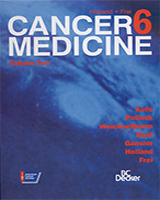By agreement with the publisher, this book is accessible by the search feature, but cannot be browsed.
NCBI Bookshelf. A service of the National Library of Medicine, National Institutes of Health.
Kufe DW, Pollock RE, Weichselbaum RR, et al., editors. Holland-Frei Cancer Medicine. 6th edition. Hamilton (ON): BC Decker; 2003.

Holland-Frei Cancer Medicine. 6th edition.
Show detailsThe Oncology Nursing Society Statement on the Scope and Standards of Advanced Practice in Oncology Nursing defines an oncology advanced practice nurse (APN) as a registered nurse with a minimum of a master's degree in nursing. The APN has acquired advanced, in-depth knowledge and preceptored clinical experiences in oncology that enable her or him to exhibit a high degree of independent and collaborative judgment and clinical skill in providing nursing care to patients with cancer and their families.15 The advanced practice of oncology nursing is used throughout the cancer care continuum with APNs functioning in the acute care setting, in private physician practices, in ambulatory clinics, in long-term follow-up clinics, in prevention centers, in the provision of cancer genetic counseling, and in the provision of supportive and palliative care.
Of the four traditional advanced practice nursing roles (ie, clinical nurse midwife, nurse anesthetist, clinical nurse specialist, and nurse practitioner), those of clinical nurse specialist (CNS) and nurse practitioner (NP) are most commonly seen in cancer care. In all these roles, there is emphasis on providing nursing care at an advanced level to patients and families through comprehensive health assessments, the identification of normal and abnormal health characteristics, treatment of a variety of human responses throughout the cancer care continuum according to practice guidelines, protocols, or standing orders, initiation of appropriate care, and the continuous evaluation of outcomes. The range of competencies include direct care, coaching, consultation, collaboration, ethical decision making, research utilization and leadership.62 Table 71-4 reviews the roles of the CNS and NP.63–65
Table 71-4
Role Functions of Clinical Nurse Specialists and Nurse Practitioners.
Oncology NPs will generally spend a greater percentage of time as a direct caregiver than will CNSs. Depending on the state in which an APN is licensed, the scope of practice includes varying degrees of prescriptive authority and physician supervision required, and title recognition. In only a few states do APNs have Drug Enforcement Agency (DEA) licensure. The APN must be licensed in her or his state as a registered nurse and is subject to that state's legal constraints and regulations for recognition and licensure of advanced practice. Oncology nurse practitioners can effectively meet both the medical and nursing needs of patients by functioning in a collaborative practice model supported by a shared philosophy of practice, written agreements delineating shared responsibilities and accountability, incorporation of the role into day-to-day practice, and regular evaluation and readjustment of goals.
Changes in the healthcare system have challenged professionals to improve the delivery of cancer care services. As a result of these demands, the role of the oncology advanced practice nurse has continued to expand. The ONS believes that APNs are a vital component of the healthcare team that provides care to patients with cancer and that barriers to full use of APNs must be addressed. Two consistent barriers are reimbursement and prescriptive authority. The United States Congress recognized the role of NPs and CNSs in meeting the nation's healthcare needs when it enacted Section 4511 of the Balanced Budget Act of 1997, which extended Medicare coverage for professional services provided by NPs and CNSs to all geographic areas and treatment settings. However, many third-party payors still do not recognize the APN as a credentialed practitioner, thus creating an impediment to full practice. Currently, tremendous variability exists in the scope of practice and prescriptive authority for APNs across the United States. This variability presents multiple barriers that prevent APNs from practicing at the highest professional level. To promote quality cancer care and to adequately manage the symptoms, such as pain, that can affect a patient's quality of life, the oncology APN must be granted prescriptive authority for medications, blood products, and nutritional supplements. The inclusion of controlled substances within the scope of prescriptive authority for APNs is a vital component to ensure optimal symptom management in patients with cancer.66
To advance quality cancer care, it is critical that the fields of medicine and nursing form collaborative partnerships that recognize and mutually respect the contributions of each discipline to quality cancer care. Eight state medical oncology associations (Connecticut, Delaware, Georgia, Kansas, Louisiana, New Jersey, New York, and Texas) have endorsed the ONS position regarding the role of the APN in oncology care. As nursing roles have expanded, the traditional boundaries between the two disciplines have blurred. To fully collaborate, professional partners must be secure in their individual professional identities to fully support and promote each partner's professional integrity and contribution to quality patient care.67 Barriers that must be overcome to achieve full collaboration are lack of education regarding role effectiveness, stereotyping of nursing roles, lack of clinical and interpersonal competence, physician resistance to acceptance of the role, and conflicting values between the professionals involved.68–70
- Advanced Practice in Oncology Nursing - Holland-Frei Cancer MedicineAdvanced Practice in Oncology Nursing - Holland-Frei Cancer Medicine
Your browsing activity is empty.
Activity recording is turned off.
See more...